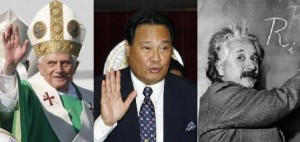
In debates and discussions contenders often cite authority to support their assertions. In some cases citing authority is the strongest strategy while in others it is the weakest.
The German sociologist Max Weber identified three types of legitimate authority:
- The first type discussed by Weber is Rational-legal authority. It is that form of authority which depends for its legitimacy on formal rules and established laws of the state, which are usually written down and are often very complex. The power of the rational legal authority is mentioned in the constitution.
- The second type of authority is Traditional authority, which derives from long-established customs, habits and social structures. When power passes from one generation to another, then it is known as traditional authority.
- The third form of authority is Charismatic authority. Here, the charisma of the individual or the leader plays an important role. Charismatic authority is that authority which is derived from “the gift of grace” or when the leader claims that his authority is derived from a “higher power” (e.g. God or natural law or rights) or “inspiration”, that is superior to both the validity of traditional and rational-legal authority and followers accept this and are willing to follow this higher or inspired authority, in the place of the authority that they have hitherto been following.
In law, or more particularly in the interpretation of the law, final authority is clearly vested in the Supreme Court, so whatever the Supreme Court says about how a certain law should be interpreted, that’s the way it should be interpreted. The authority of the Supreme Court is an example of rational-legal authority, hence, citing jurisprudence is very effective in legal arguments.
In religion, it gets a little tricky. If the debaters are from different religions, they will be citing different authorities (holy books, popes, pastors, prophets) that often contradict one another. But even if they belong to one religion, say, Christianity, authority may not be as clear cut as it’s supposed to be.
As I mentioned in a previous post, the Church’s authority was originally derived from Jesus’ alleged charismatic authority which overcame the Pharisees’ traditional authority at the time – at least among his disciples, who later on “routinized” Jesus’ charismatic authority into the traditional authority of the Church. But centuries later a ranking member breaks away to wield his own charismatic authority, and the cycle continues. So now the question is, who is the final authority in Christianity – meaning who gets to say what Jesus supposedly meant to say (in the same degree as the Supreme Court gets the final say as to what the framers of the constitution meant to say)?
Weber’s three types of legitimate authority have been exercised by the State (rational-legal) and the Church (traditional and charismatic), so what is left for science? Nothing. When someone cites “scientific authority”, such authority can be quickly refuted by presenting new evidence or by performing the same controlled experiments and coming up with different results.
The philosopher and lawyer Morris Raphael Cohen wrote in Reason and Nature:
As the proponents of science would say, in science there are no authorities, only experts, so when we debate about science the “authority” is only as good as their last experiment or observation. If we debate about the law, authority really counts and is virtually absolute. But when we talk about religion, authority is limited within each sect, where the leaders can teach their dogma to their respective members and no one can openly question or disobey them without having to leave that particular sect. But once outside the sect, religious authority ends, and no one is deemed infallible.


innerminds, here is something about evolution and cosmology. this is a bit lengthy but worth the read. (ive been meaning to send this to you but only had the chance today) i recently attended a lecture by dr. william carroll at columbia university, this article is not a transcript but exactly what was discussed. the lecture was entitled Creation and a Self-Sufficient Universe: Evolution, Cosmology, and Thomas Aquinas. enjoy and ill wait for your response, looking forward for more discussions to come.
Bio: William E. Carroll is a European intellectual historian and historian of science whose research and teaching concern 1) the reception of Aristotelian science in mediaeval Islam, Judaism, and Christianity, and the development of the doctrine of creation, and 2) the encounter between Galileo and the Inquisition. He has also written extensively on the ways in which mediaeval discussions of the relationship among the natural sciences, philosophy, and theology can be useful in contemporary questions arising from developments in evolutionary biology, the neurosciences, quantum physics, and cosmology.
He has lectured throughout the United States and Canada, and also in England, Ireland, Italy, France, Spain, Germany, Poland, Sweden, the Czech Republic, Slovakia, Hungary, Austria, Morocco, Chile, Argentina, and Australia. Recently, he has been a visiting professor at the Catholic University of Argentina and at the Catholic University of Chile. Currently he is the Thomas Aquinas Fellow in Theology and Science at Blackfriars Hall, Oxford, and a member of the Faculty of Theology of the University of Oxford. In addition to having written various essays, he is the editor of Nature and Motion in the Middle Ages, co-author of Aquinas on Creation, author of La Creacion y las Ciencias Naturales: Actualidad de Santo Tomas de Aquino, and Galileo: Science and Faith.
http://www.catholiceducation.org/articles/science…